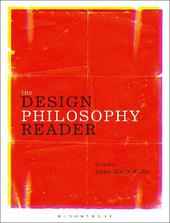
|
The Design Philosophy Reader
Hardback
Main Details
| Title |
The Design Philosophy Reader
|
| Authors and Contributors |
Edited by Professor Anne-Marie Willis
|
| Physical Properties |
| Format:Hardback | | Pages:320 | | Dimensions(mm): Height 246,Width 189 |
|
| Category/Genre | Theory of art
Industrial / commercial art and design |
|---|
| ISBN/Barcode |
9780857853493
|
| Classifications | Dewey:745.401 |
|---|
| Audience | | Tertiary Education (US: College) | | Professional & Vocational | |
|---|
|
Publishing Details |
| Publisher |
Bloomsbury Publishing PLC
|
| Imprint |
Bloomsbury Visual Arts
|
| Publication Date |
29 November 2018 |
| Publication Country |
United Kingdom
|
Description
What is design philosophy and why is it needed? This important book explains the discipline's recent emergence, the key questions which dominate it, and its potential to fundamentally change the way we practice and think about design. The reader comprises eight thematic sections, each featuring a short, contextualising introduction and an annotated bibliography. It considers social, graphic, product and industrial design, and presents the writings of such leading design thinkers and philosophers as Deleuze and Heidegger, Aristotle and Plato. With texts ranging from philosophically informed writing on design and culture, to ancient and contemporary philosophy which addresses the concept of design, The Design Philosophy Reader is an impressive and pioneering work.
Author Biography
Anne-Marie Willis is Visiting Professor of Architecture and the Built Environment at the University of Adelaide, Australia and editor of Design Philosophy Papers at The Studio at the Edge of the World.
ReviewsIn the case of The Design Philosophy Reader, the editor's proficiency as an educator and design scholar becomes evident in how each excerpt is curated for a higher education context. Willis skillfully navigates the limitations of the format and manages to offer a coherent, thought-provoking whole that dynamises the relationships between the selected texts. * Journal of Design History * More clearly perhaps than any other human science or profession, and in the face of complexly intertwined social, ecological, and cultural crises, design is emerging as a crucial domain of thought and action about life itself. The present is thus an auspicious moment for systematizing a philosophy of, from, and for, design as a strategy for rendering design into a more thoughtful and effectively reconstructive practice. By drawing on both philosophy and the most current strands of critical social theory, The Design Philosophy Reader provides us with the pillars for such a project. I cannot think of anybody more qualified to undertake this task than Anne-Marie Willies, a true pioneer of the design/philosophy interface. In contrast to the much more limited and highly popularized paradigm of design thinking, the Reader demonstrates why the redesigning of design, as the redesigning of the conditions of our collective existence, is the most important intellectual and political project designers and informed citizens can undertake in the current planetary conjuncture. * Arturo Escobar, Distinguished Emeritus Professor of Anthropology at the University of North Carolina, Chapel Hill, USA * This is a thoroughly comprehensive text which highlights the connections between philosophy and design. Useful guides to further reading are presented throughout. There is an acceptable balance between older and newer texts, organised into eight distinct parts, together covering an impressively wide range of thinking. Numerous contributors highlight the pervasiveness of design, the current state of thinking and practice of design. This text will be of value to both design theoreticians and practitioners, and should prove to be an essential addition to all design libraries or collections. * Michael Hann, Chair of Design Theory at the University of Leeds, UK * The Design Philosophy Reader reminds us that inquiry into the histories and systems that structure 'design' - language, visuality, colonialism, capitalism - must ground our understandings of, and engagements with, it. * Shana Agid, Assistant Professor of Art, Media and Communication at Parsons, The New School, USA * Through Willis' astute selection and structuring of key texts, The Design Philosophy Reader offers theoretical apparatus to develop critical thinking within the study and practice of design. It fundamentally opens design to be interrogated and theorized beyond the parameters of professional design and norms within academic design theory today. It will be of interest to anyone interested in questioning design as a condition of existence, and those who seek to problematize the discipline. * Matt Malpass, Programme Coordinator for Ceramic and Industrial Design at Central Saint Martins, University of the Arts London, UK * Editor Anne-Marie Willis's own practice of 'designing' the Reader is demonstrated in the introduction to this section, where in just two pages the she gives a richly considered, potted-history of philosophy, showing how notions and practices of design and philosophy are mutually implicated... The Reader contains older, essential design-related texts from philosophers such as Claude Levi-Strauss, Jean Baudrillard, Henri Lefebvre, Martin Heidegger, Gilbert Simondon, and more recent significant thinkers such as Bruno Latour, Bernard Stiegler, Rosa Braidotti, Isabelle Stengers and Judith Butler... The book contains essays that should be required reading for both research and professional work... Willis's curation of the Reader is compelling, not least because she has a critical vision; this is not a sample of work, or just a collection of the great and good. * John O'Reilly, Eye Magazine * This book establishes in a very clear way the grounds for research on the philosophy of design. It raises meaningful contradictions that allow postgraduate students to reflect more deeply on their roles as researchers in design. The sections covering designing of visuality and narrative are absolutely brilliant! * Dr. Catarina Lelis, Senior Lecturer in Branding and Innovation, University of West London, UK *
|